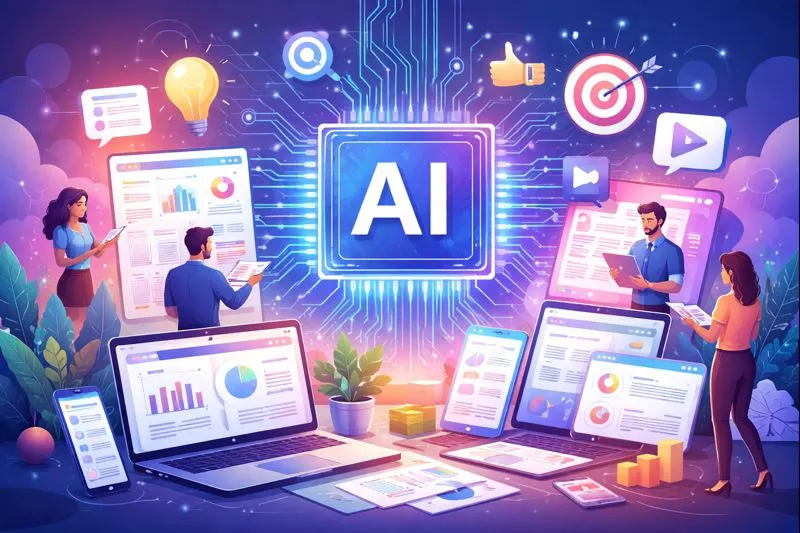How AI Is Revolutionizing Startup Building in 2025
TL;DR
How AI Is Revolutionizing the Way Startups Are Built in 2025
In 2025, building a startup looks drastically different than it did just a few years ago. Founders are no longer relying solely on intuition, spreadsheets, and long hours to get their businesses off the ground. Instead, they’re tapping into the power of artificial intelligence (ai) to move faster, make smarter decisions, and stay lean.
ai has evolved from a buzzword into a practical co-founder—capable of assisting in nearly every phase of the startup journey. From ideation and planning to marketing and customer support, today’s entrepreneurs are leaning on intelligent systems to build better businesses from day one.
Let’s take a closer look at how ai is transforming the startup landscape in 2025.
1. Smarter Ideation and Market Validation
In the past, validating a startup idea required weeks of manual research, surveys, and trial-and-error. ai has turned this on its head.
Startups now use ai tools to analyze trends, identify underserved niches, and even simulate product-market fit scenarios before writing a single line of code. Tools like ChatGPT can be used for brainstorming and generating initial ideas, while platforms like Google Trends or Exploding Topics help uncover emerging market demands. These tools tap into massive datasets—search queries, social media behavior, competitor strategies—and surface insights that would take a human team months to uncover.
This gives founders a clear direction early on and reduces the risk of building something nobody wants.
2. AI-Driven Business Planning
One of the most critical (and often overlooked) phases in launching a startup is the planning stage. Business plans are essential for fundraising, setting milestones, and mapping out growth strategies. And when it comes to fundraising, tools like Eqvista’s Real-Time Company Valuation™ give founders instant, AI-powered valuations, helping them raise capital, issue ESOPs, and negotiate with confidence. But creating a robust plan from scratch can be time-consuming—especially for first-time founders.
This is where ai steps in. Platforms like PlanPros allow entrepreneurs to generate tailored business plans using ai-powered inputs. By analyzing your business idea, industry, and goals, the tool helps craft a professional plan that’s both investor-ready and execution-focused. Instead of spending weeks building a plan manually, founders can now do it in hours—with data-backed structure and clarity.
3. Leaner, Faster MVP Development
Rapid prototyping is essential for early-stage startups, and ai has drastically reduced the time it takes to build a minimum viable product (mvp). With tools like low-code platforms such as Bubble or Webflow, and generative design systems, founders can move from concept to prototype with fewer resources. We're also seeing ai code assistants like GitHub Copilot that suggest code snippets and help catch errors, which can significantly speed up development and reduce what we call "technical debt" – basically, the shortcuts or less-than-ideal code choices made early on that can cause problems down the line.
Some ai development tools even offer code suggestions, bug detection, or automated testing—accelerating the build phase and reducing reliance on large development teams.
4. AI-Powered Marketing from Day One
Gone are the days when marketing was driven purely by guesswork or expensive agencies. Startups now launch with ai support for everything from content generation and email campaigns to social media scheduling and ad optimization. Because a lean mvp allows for quicker iteration and testing, you can immediately start applying ai-driven marketing strategies to see what resonates with your early users.
ai tools can segment audiences, predict engagement, and even auto-generate copy tailored to different platforms. Tools like Jasper or Copy.ai can help craft marketing copy, while platforms like AdEspresso use ai to optimize ad spend across social media. This allows founders to maintain a lean operation while still competing in a crowded digital space.
5. Personalized Customer Experience at Scale
Startups today are expected to deliver customer experiences on par with established brands. ai makes this possible.
Whether it's ai chatbots that provide instant support or recommendation engines that tailor offerings to individual users, startups can now deliver 24/7, highly personalized service—without scaling up large teams. These recommendation engines work by ai analyzing vast amounts of user data—like past purchases, browsing history, and even how long someone spends looking at a product—to predict what they might like next. This means showing the right product to the right person at the right time.
The New Standard for Startup Success
The ai revolution is leveling the playing field. In 2025, a solo founder with the right tools can build, test, and launch a product that competes with companies ten times their size. While hustle and vision still matter, ai has become the secret weapon behind smart execution.
Startups that embrace ai from the start aren't just keeping up—they’re pulling ahead.
Final Thoughts
ai isn't just an efficiency booster—it’s a strategic advantage. It reduces startup costs, accelerates timelines, and brings a level of insight and precision that founders could only dream of a decade ago. This strategic advantage is key because ai can unlock entirely new revenue streams, create defensible intellectual property that competitors can't easily replicate, and even enable entirely new product categories that wouldn't be feasible without its capabilities. As the startup ecosystem becomes more competitive, those who adopt AI early—and wisely—often draw on insights from top AI consulting companies to make informed, sustainable decisions that support long-term success.



